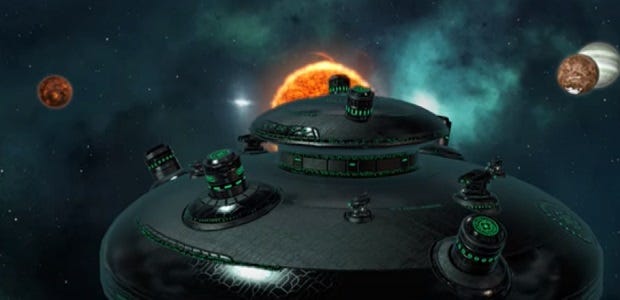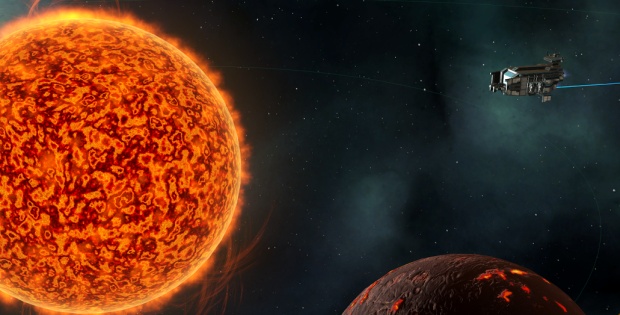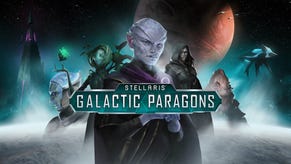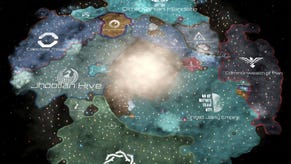Twilight Of The Space Gods: Three Tales From Stellaris
Calimari, cults and...XCOM?
My review of Stellaris [official site] will be published on Monday. You'll have to wait until then to read a full judgement and critique of what Paradox have accomplished in the time since that first oh-so-exciting announcement, but I couldn't resist sharing some stories right now. Here are just a few tales from an infinity of galaxies.
At this week's multiplayer event, one journalist was already referring to it as the XCOM event. A galactic empire with expansionist tendencies finds a pre-FTL civilisation and monitors them from orbit, preparing for an eventual invasion. Scientists spy the ship and panic ensues. An international extraterrestrial combat force is formed and they succeed in shooting the UFO out of the sky, celebrating their victory over the invaders.
In this scenario, one of hundreds that can play out, you're playing as the galactic empire rather than the defenders of Earth (or this particular Earth analogue). What happens to those plucky terrestrials next is entirely up to you. Eliminate them, educate them or leave them be...
Like Crusader Kings before it, Stellaris is a grand strategy game (as well as being a 4X game, of which more in the review) but it's also an engine for the generation of stories. Here, they're not alternate histories, of course, they're possible futures set in galaxies far far away. The game takes your chosen/created/random species from the first days of FTL travel to the days of galactic federations, despotic empires and untimely extinctions. I've played a combination of singleplayer and multiplayer for more than sixty hours already and I've found galaxies full of wonder.
Here are just three stories taken from the vast collection I've already created in collaboration with Stellaris:
1) Multiplayer Alliances And The Galaxy As A Menu
Stellaris allows you to play as all kinds of different species. They're split into several main groups – mammalian, fungoid, avian etc – but there are plenty of portraits and personality types that you can mix and match. This led to delightfully grotesque moments in the multiplayer session I took part in. Elsewhere in the galaxy, we discovered a race of spacefaring turkeys – their warcry of “GOBBLE GOBBLE” haunts me – and after years of peaceful co-existence, my happy Cthulhus and the people of our federation finally took against these feathered fiends. I renamed a nearby system the Bernard Matthews Processing Plant and left those words hanging in space as a terrible warning.
Fungoid friends feared that they may become mushroom omelettes and my monstrosities were convinced they'd see a Calimari Lovers League cropping up in some dark corner of the galaxy.
The species that populate the galaxy lend themselves to silliness in a way that's entirely in keeping with Paradox's writing. While the studio's games may be intricate, complex things, covering centuries of history with remarkable depth, they've always had a sense of humour about them. Stellaris is full of horrors and mysteries, but wanting to eat your neighbours seems a heck of a lot funnier than it would in almost any other context.
2) Fallen Empires And Getting Put On The Naughty Step
Stellaris begins just as your species' greatest adventure begins – you're ready to head to new stars, seeking to understand the secrets of the universe. Your home planet is covered in industrial wasteland and sprawling slums, having been cyberpunked to fuck in the decades since VR really took off and people forgot how to go to the toilet. It's a mess, there aren't enough jobs to go around, and it's really time for the kids to move out and find a new place to live.
Off to space they go, then, looking for planets to colonise. It's a big place, space, so you might not run into anyone else for a while and even when you do, chances are they're even more primitive than you, or they're at just about the same point in their development: exploring, expanding, exploiting and exterminating. Maybe even trying to make friends.
Problem is, you're not the first gang to arrive in the spaces between the stars. Fallen Empires are one of Stellaris's more unusual concepts. They're ancient civilisations that have been doing the whole interstellar community gig for a long time, and they begin the game with every in-game tech and some of their own tricks that you'll never be able to replicate.
There are several variants but my most memorable encounter with a Fallen Empire also came during that multiplayer game. These fellows were isolationists and when they first opened a communication channel with my Cthulhus, they weren't happy to see us. They said we were like children, running around space and making a ruckus, and they wanted us to stay the hell away from their magnificent ringworlds.
Specifically, they wanted me to abandon four colonies that were near their borders. I guess they could pick up our radio and TV from there or something and thought we had terrible taste. From their perspective we were infants so even our most sophisticated programming probably felt like a constant loop of the worst of Cbeebies. That hot new playwright we're always banging on about who really nailed intergalactic politics in that one play with the space-king who divided his stardom among his daughters? That's equivalent to the Teletubbies.
Little wonder, then, that they wanted me gone. I dutifully abandoned the colonies, not wanting to drag my allies into a war that we could never win, and I thought that'd be the last of it.
A few years later, another insult arrived with another list of demands attached. This time they wanted me to abandon even more planets and wanted to see me humiliated. I wouldn't stand for it but after seeing precisely how much military power they were willing to hurl in our direction, I acquiesced and retreated to the naughty step.
The humiliation, previous iterations of which had involved a stern dressing down and a hit to happiness, involved the brutal murder of my democracy's president, live on stage during a speech of surrender. Stellaris can be amusing but it can also be downright brutal.
3) Painting Empty Spaces And Meeting The Old Gods
In one of my singleplayer games, I was the despot at the head of a warlike community of furious parrots. These avian menaces didn't fight in the name of a god or even under the banner of a partcular belief system; they wanted to conquer everything they saw because they found every other species in the galaxy hideous, pathetic and weak. Their main motivation was profit – they loved their cushy lifestyles so much that they were keen to enslave everything that they didn't kill so that they wouldn't have to any of the heavylifting required to run an empire themselves.
One of the things I'm enjoying about Stellaris is the ability to randomise not only the galaxy and its other inhabitants, but my own species as well. It forces me to play the game in ways that are outside my comfort zone.
In almost any 4X game I can think of, I tend to pursue science and culture (were available), seeing war as a drain on resources that could be better spent unlocking cool new tech. The thing is, that can lead to incredibly dull experiences. Pressing end turn to wait for bars to tick up and research and construction to finish, rather than moving units around and getting into a big old scrap. The momentum of games within the genre tends to involve the filling of empty space and then the fight over occupied space.
Stellaris goes some way toward changing up that flow and, again, you'll have to wait for Monday's review to find out how well that works, but it typically involves the creation of peaks and troughs. As external threats become less of a concern, you'll be forced to look inward. Essentially, as should be the case for almost any strategy game, simply painting the map in your colour shouldn't be the end-point, it should be the beginning of a new phase of the game wherein you need to make sure the paint doesn't start to crack. If you spend the rest of the game simply watching that paint dry, there's a serious problem.
My parrots were too busy knocking walls down to apply so much as an undercoat. War was a constant and our orbital bombardment took a serious toll on civilian populations. Survivors were enslaved and forced to work in the seedmines.
All of that changed when we discovered a shrine on a seemingly abandoned planet. It seemed to be connected to important periods in parrot history, but our scientists couldn't explain why it was out there in a system so distant from our home planet. Deciphering the murals on the side led them to believe that they'd uncovered some kind of starmap that included clues as to the possible locations of other shrines.
New science ships were constructed immediately – the first non-combat vehicles to leave our docks in decades – and we sent our finest minds into unknown regions. Each new shrine brought a sense of impending doom. Like a mountainload of greedy dwarves, we were digging too deep.
I'm not going to tell you how that particular story ended, but my parrots were much-changed by the things they uncovered. And I've seen different endings stemming from the same beginning. Some shrines are different to others, and sometimes you might decide to let sleeping gods lie.
There'll be many more stories here next week, when the game is out in the wild, and the review will be here on Monday, breaking down how the game works. It's a fascinating creation and there's little doubt that I'll have put in almost a hundred hours before I write the review. I have a feeling it'll still be surprising me with new stories after a thousand.




















